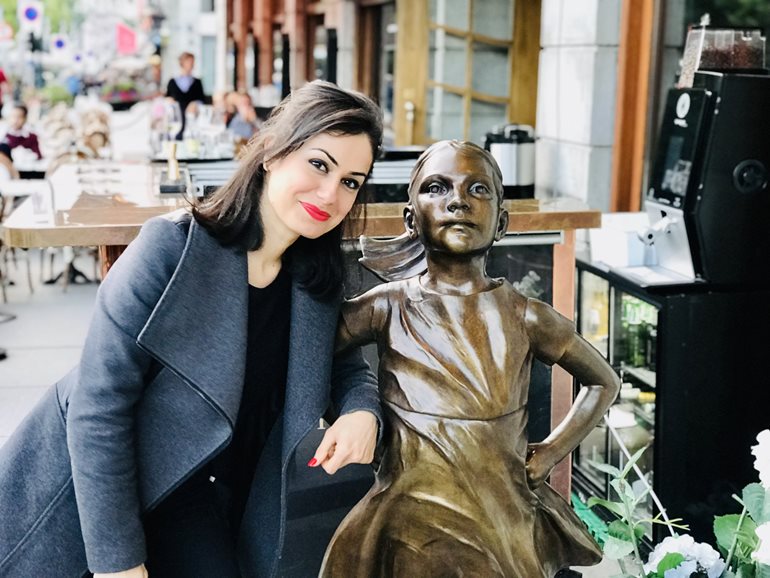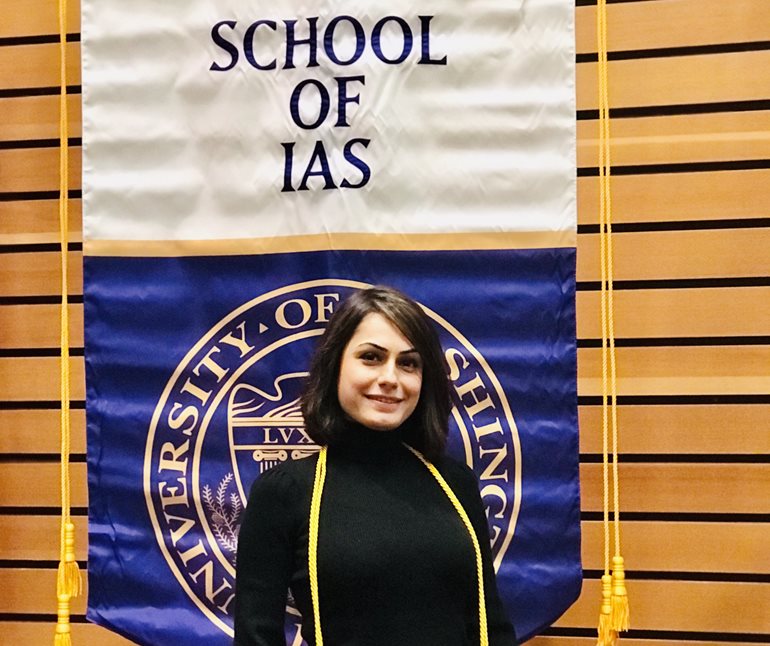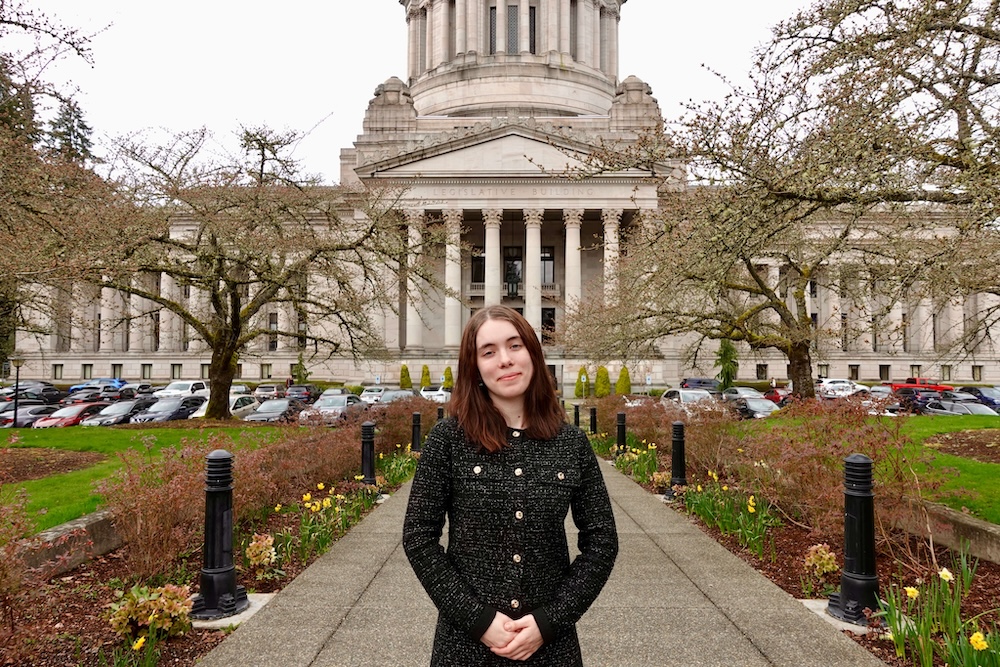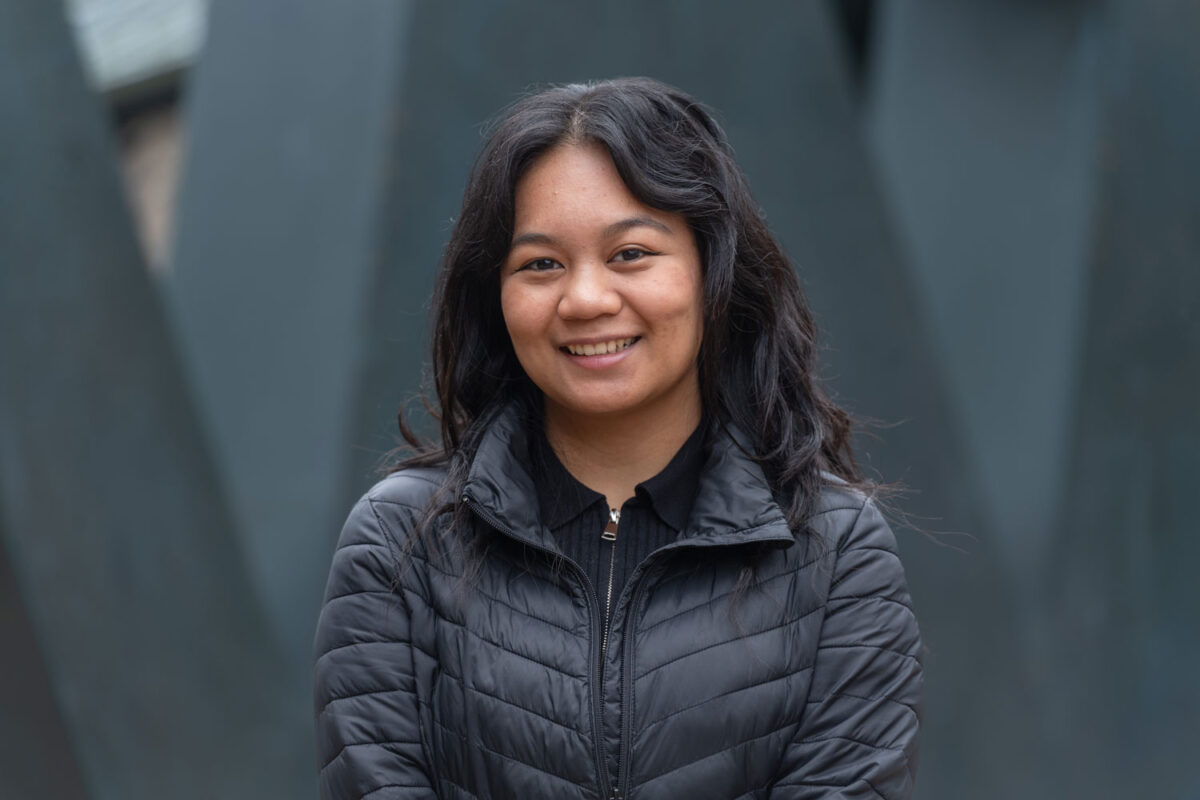Marjan Didra, a University of Washington Bothell alumna, was born in Iran and spent her childhood and adolescent years in the country where, as a woman, she was considered a second-class citizen. “In Iran, women need permission from men to leave their house,” Didra said. “Not being able to make your own decisions strips away at your dignity and, worse, your humanity.”
It wasn’t until she was 14 years old that Didra learned of feminism, quite by chance, while looking at a newspaper. “At the time our local newspaper had only one column dedicated to women — out of an entire newspaper — that was meant for them to read,” she said. “But one day, included in that single column was the definition of a feminist. I remember it read ‘women who believe that all women should have equal rights to men and can sustain and live independently of them.’
“This was a pivotal moment in my life,” she said. “I was so sheltered, like many girls my age. I was not allowed to learn about these things and had thought I was the only one who had such beliefs, where women can have their own voice and agency.”

Realizing she was not alone was the first step toward her decision to leave Iran and come to the United States. “I wanted to live in a place where I could be independent,” Didra said, “where I could make decisions to pursue college, start a business and really — to just live life the way I wanted to live it and feel safe.”
There were many steps between that moment and where she is now: pursuing a Ph.D. in Educational and Organizational Learning and Leadership while working as the King County Veterans Affairs director for Sen. Patty Murray’s office.
Biggest, most glorious accomplishment
“I feel I have lived a most extraordinary life,” Didra said. “I have been very fortunate.”
Yet she says her greatest accomplishment to date is leaving Iran and becoming an American citizen. “It is the biggest, most glorious thing I have ever done,” she said. “I really cannot emphasize that enough.”
That doesn’t mean, however, that integrating in her new country was easy. Didra came to the U.S. alone, with no family, no friends or even acquaintances. “It is really difficult for those who are marginalized within their home countries to then take on the challenge of migration and move entirely to a different country,” she said. “When you live in such an oppressive environment for such a long time, that oppression doesn’t just live in your body, it lives in your mind.
“Even though I was in a different place where I didn’t have to wear a hijab and was free to make my own decisions,” she said, “my mind was still imprisoned, and that took a long time to overcome.”
Didra yearned for support, a community of other women who had come from Iran, but it proved hard to find. Even without that, she said, she managed to focus her mind on her goals and started a small business doing photo booth rentals.
Then, one day, UW Bothell hired her for an event on campus. “I vividly remember thinking, ‘Wow, I would love to go to school here,’” she said. “It planted the seed in my head but at the time, school wasn’t a choice. I needed to keep myself afloat financially.”
Reconciling inner turmoil
Thankfully, Didra’s business was successful, and a few years later she began thinking seriously about getting a business degree. Her dream was to start a nonprofit organization aimed at helping fellow immigrant women integrate and start businesses of their own. She began looking at UW Bothell’s degree offerings and came across the Gender, Women & Sexuality Studies major in the School of Interdisciplinary Arts & Sciences. She graduated with her B.A in GWSS in 2018.

“The program explored feminist studies,” she said, “what it is like to be a woman and to be a woman of color. Coming from Iran this was intriguing to me. I wanted to understand myself and my experiences and felt pulled to enroll.”
Through the major, she was able to dive into issues related to race and gender that ignited her passion. She got involved in organizations such as Women for Women International, World Vision, Child Fund International, the American Red Cross and Just Say Hello. “I wanted to spread awareness about the injustices taking place, such as lack of access to education for women and girls in the Middle East and other developing countries as well as housing and homelessness issues.
“But after a few years of advocacy, I realized that other than bringing awareness to the issues I didn’t have much influence,” she said. “I decided I wanted to sit at the table where decisions are made, to understand how and why.”
So she next enrolled in the UW Bothell’s Master of Policy Studies program, graduating in 2019. Now, she uses her life experiences and degrees to serve veterans, whose experiences aren’t all that different from her own. Members of the military serve in extremely austere environments and, when they return as veterans, face similar struggles of feeling imprisoned by their minds, often suffering from post-traumatic stress disorder.
The difficulty of integrating in unfamiliar communities is something she has experienced firsthand and wants to help veterans navigate. “I know what it is to struggle in a new place, to reconcile your past with your present,” she said. “Above all else, I want to help give our veterans and their family members a better life.”
And outer turmoil, too
Didra’s spouse served in the Iraq war, so she said she has also seen firsthand the effects war can have on soldiers.
“I would go with my spouse to the Department of Veterans Affairs, and things rarely went the way we planned or hoped,” she said. “It would be so frustrating, and I wanted so badly to help improve the system. Now I have the chance.”
Working in Sen. Murray’s office, Didra’s primary responsibility is to help veterans and their families understand how existing policies affect them. “When there are new laws implemented at the VA, it is essential to try and figure out how that law impacts our veterans. Then we figure out how to make it better,” she said.
One of the more recent policies she worked on was related to the GI Bill, which has helped millions of military service men and women pursue degrees. It includes full tuition for in-state schools, a basic allowance for housing and a sum of money for books and other school supplies. The contingency is that to receive this funding, the veterans must be on the school campus.
“When COVID-19 hit and everything was remote, this was no longer possible,” she said. “We had so many veterans fearful they might lose their basic allowance for housing given the VA’s on-campus attendance policy. I attended many listening sessions and took what I heard to our office which helped work on policy.
“Ultimately,” she reported, “Congress provided the necessary extensions to ensure veterans were able to use their benefits.”
Resources at the ready
Didra said UW Bothell gave her the possibility of a better future — and that’s what she likes to do for veterans.
“To all the veterans at UW Bothell, please reach out to me,” she encouraged. “If you need help with your earned GI Bill benefits, access to records, or other VA-related issues, please know that I will be happy to assist.
“The University has empowered me through education, and our brave men and women in uniform gifted me my freedom. I want to pay that forward.”
Marjan Didra can be reached at marjan_didra@murray.senate.gov. She also provided this list of helpful resources for veterans.



